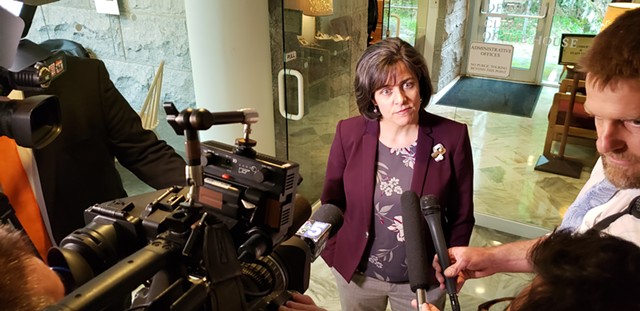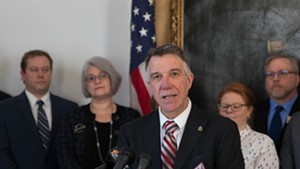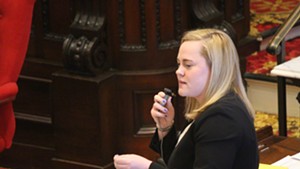Vermont House Adjourns, Senate Remains as Minimum Wage and Paid Leave Deal Collapses

- Kevin McCallum
- House Speaker Mitzi Johnson announces Friday that the House would adjourn without reaching a deal on key Democratic priorities.
A standoff between the Democratic leaders of the Vermont House and Senate deepened Friday as one chamber attempted to adjourn for the year and the other vowed to remain in session.
At issue were bills to raise Vermont’s minimum wage and enact a paid family and medical leave program. Though a majority of lawmakers in both chambers appeared to support the proposals, House and Senate leaders failed, after days of intense negotiations, to resolve remaining differences.
After declaring an impasse Friday afternoon, House Speaker Mitzi Johnson (D-South Hero) gaveled out her chamber and summoned Republican Gov. Phil Scott to deliver a customary end-of-session address. But the Senate had other ideas.
In an unexpected twist, Senate President Pro Tempore Tim Ashe (D/P-Chittenden) refused to adjourn for the year and scheduled another Senate session for next Wednesday. He called on House members to change their minds and return next week to reach a deal.
“We’ve created an opening,” Ashe said of his last-ditch legislative gambit, “and we believe it wouldn’t take much time really to close that last gap.”
On his way out of the Statehouse Friday evening, Scott shook his head in disbelief at the Dems’ disarray.
“It’s very bizarre,” said the governor, who has served in state government since 2001. “I’ve never seen anything like it.”
Speaking to reporters late Friday in his Statehouse office, Ashe expressed optimism that the elusive deal was still in sight. “I think we all feel that it’s so doable that it makes sense to come back,” he said.
But even as he made those remarks, House members filed out of the building carrying boxes of their belongings. Through Ashe’s window, representatives could be seen hugging and bidding one another farewell for the year.
The two chambers, both of which are dominated by Democrats and Progressives, have battled over the bills for months.
The Senate has prioritized raising the minimum wage to $15 an hour, while the House has favored a family and medical leave program. Versions of both proposals secured approval in both chambers, but the House slowed the pace of the wage increase and the Senate watered down the paid leave program.
Scott, for his part, has expressed skepticism about both initiatives, arguing that they are too expensive and could harm Vermont businesses. Though he has not explicitly stated whether he would veto either bill, many in the Statehouse believe that to be the case.
Nevertheless, House and Senate negotiators worked feverishly in recent days to reconcile competing versions of the bills. They expressed optimism late Thursday that they could reach consensus. But by Friday morning, such hopes had faded.
Related Vermont Legislators Seek Last-Minute Deal on Minimum Wage, Paid Leave

Vermont Legislators Seek Last-Minute Deal on Minimum Wage, Paid Leave
By Kevin McCallum
Off Message
Jubilee McGill, a leader of the activist group Rights & Democracy, stormed out of the Senate chamber when it became clear that neither bill would make its way to Scott.
“It feels like egos really got in the way of progress this session,” she said later, on the verge of tears.
Main Street Alliance of Vermont lobbyist Ashley Moore, whose progressive business organization has been a leading champion of the paid leave proposal, said she was disappointed but respected Johnson’s decision to hold out for a better deal.
“At the end of the day, if you can’t be proud of the end result, I believe it’s better to wait and do it right,” Moore said.
The dysfunctional day of competing parliamentary maneuvers and dueling press conferences started ominously when, just before 10:30 a.m., Johnson released to the media a letter to Ashe summing up the state of negotiations.
“At this point, we seem to be at impasse,” she wrote.
The speaker told Ashe that he had until noon to agree to one of five compromise proposals acceptable to her members. If he refused to do so, she wrote, the Senate should pass the remaining budget and revenue bills and bring the session to a close.
“It’s time to wrap up and go home,” Johnson wrote.
Noon passed and there was no agreement.
The two leaders met midafternoon — Ashe with sandwich in hand — in Johnson’s office, but evidently made no headway. The pro tem emerged without comment. The speaker told members of the press that the House would soon adjourn and take the bills up again next January.
“We keep discussing different things and we don’t feel like there’s been a whole lot of movement,” Johnson said in an interview. “I think at this point we’re out of time.”
The speaker added that, by pausing the process until next year, legislators would have the chance to better understand the governor’s concerns — and strengthen her caucus’ resolve, should he choose to veto the bills.
An hour after the meeting concluded, Ashe issued a written statement suggesting that the Senate hadn’t quite given up hope.
“My Senate colleagues and I recognize the strong negotiating position the Speaker holds,” Ashe said in the statement. “Our priority is to accomplish the mutual goals of delivering economic relief to Vermonters in the form of a robust paid leave program and a meaningful increase to the minimum wage.”
The pro tem wrote that the Senate would send “compromises on both” bills to the House.
As they were preparing to do so, Lt. Gov. David Zuckerman, a Progressive and Democrat, cautioned his colleagues not to get “wrapped up in the moment-to-moment melee” of the Statehouse.
“I hope this body will pause and reflect, and I hope others will pause and reflect, on how we should best serve the state of Vermont.”
With the House resolved to adjourn, Senate leadership concluded that the best course of action was to figure out a way to keep the session alive — at least, in theory. So when the House sent the budget bill to the Senate late Friday, the latter body kicked it back to the former, along with new offers on minimum wage and paid family leave.
Though the House passed a resolution to adjourn, such measures must be approved by both chambers to take effect. Because the Senate did not follow suit, the House is not technically in adjournment.
Related Vermont Senate Offers Two-Year Minimum Wage Boost as 'Compromise'

Vermont Senate Offers Two-Year Minimum Wage Boost as 'Compromise'
By Kevin McCallum
Off Message
The Senate’s latest paid leave proposal also moved toward the House’s position, allowing personal disability insurance as an optional benefit for workers who paid for it.
Ashe described the differences between the House and Senate positions as “razor thin” and a “whisker-width distance.”
Asked to explain why, then, the two bodies couldn’t bridge the gap, Ashe effectively blamed the House for “pressures” and “issues” preventing them from acting decisively.
“I’ve always told the speaker I don’t envy her role,” the pro tem said.
Ashe noted that the risk of a veto by the governor made the negotiations particularly fraught this year.
The goal all along had been to craft something that could become law, said Sen. Becca Balint (D-Windam). The Senate was “not interested in passing something” that would just be vetoed, she said.
Sen. Alison Clarkson (D-Windsor), who was also on the Senate negotiation team, said she didn’t think a gubernatorial veto on the bills was certain.
She noted that lawmakers had made a number of concessions to address the governor’s concerns, including allowing a third-party administrator to run the paid leave program and keeping its cost down to 2 cents per every $10 earned.
“We’re hopeful he will look at it with new eyes,” Clarkson said.
That now seems unlikely, unless the House does an about-face very soon.
That’s something Rep. Pattie McCoy (R-Poultney), the House minority leader, said is highly unlikely. She said she trusts Johnson as a person of her word and has no reason to believe the speaker would reverse course and call representatives back next week.
“I can’t see anything like that happening,” McCoy said.
Disclosure: Tim Ashe is the domestic partner of Seven Days publisher and coeditor Paula Routly. Find our conflict-of-interest policy here: sevendaysvt.com/disclosure.
Related Stories
-

Senate Passes Minimum Wage Bill, but Scott Remains Cool to Proposal
by Colin Flanders January 30, 2020
-

House Backs Modest Increase to Vermont's Minimum Wage
by Paul Heintz January 24, 2020
-

2020 Hindsight: Vermont Dems Vow to Quickly Pass Initiatives That Stalled Last Year
by Kevin McCallum January 7, 2020
-

The Parmelee Post: Enraged Fans Demand Rewrite of Legislative Season Finale
by Bryan Parmelee May 30, 2019
-

Jilted by House, Vermont Senate Adjourns for the Year
by Kevin McCallum May 29, 2019
Speaking of...
-

Bernie Sanders Calls for Joe Biden to Stay in the Presidential Race
Jul 13, 2024 -

Cleanup Begins as Vermont Recovers From Severe Flooding
Jul 12, 2024 -

From the Publisher: Football Fans
Jun 26, 2024 -

Monkton Man Cited for Allegedly Threatening Lawmaker
Jun 21, 2024 -

Vermont Lawmakers Override Six of the Governor's Eight Vetoes
Jun 17, 2024 - More »





Comments (8)
Showing 1-8 of 8
Comments are closed.
From 2014-2020, Seven Days allowed readers to comment on all stories posted on our website. While we've appreciated the suggestions and insights, right now Seven Days is prioritizing our core mission — producing high-quality, responsible local journalism — over moderating online debates between readers.
To criticize, correct or praise our reporting, please send us a letter to the editor or send us a tip. We’ll check it out and report the results.
Online comments may return when we have better tech tools for managing them. Thanks for reading.